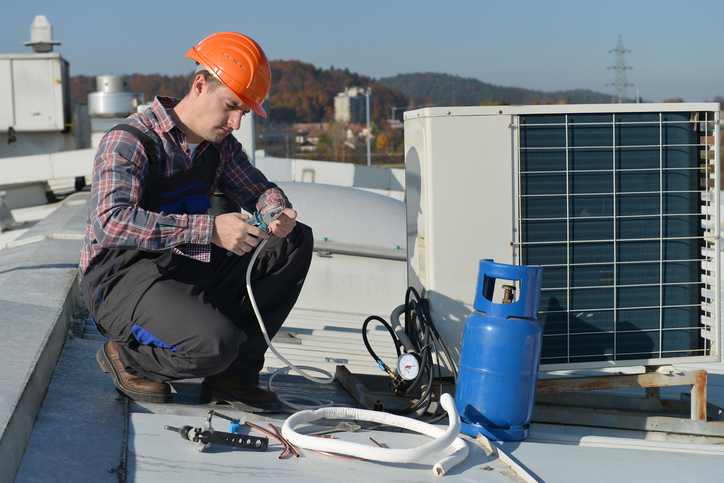
Young HVAC Technician on the roof fixing air conditioning system
A 2015 Burning Glass Technologies report prepared for the HVACR Workforce Development Foundation found that, despite the importance of HVAC to the nation’s economy, talent is scarce. The report found that (1) HVACR jobs are plentiful throughout the U.S.; (2) HVACR jobs provide good salaries and a good quality of life; and (3) HVACR jobs are available for individuals with many skillsets.
According to Burning Glass Technologies, there are a number of issues contributing to the shortage of HVAC workers: (1) Colleges and vocational schools are not training enough students; (2) no clear program credentialing/accreditation exists; (3) recruitment practices are lacking; and (4) more women and minorities are needed in the profession.
Wanted: HVAC Techs with a Great Attitude
So, what’s a contractor to do when faced with a shortage of talent? If you’re like Angie Snow, partner and vice-president of Western Heating & Air Conditioning, an Orem, Utah-based company specializing in HVAC maintenance, residential, and light commercial, you’re rewriting the rules.
Asked what her company is doing to overcome the challenge of a lack of techs in the industry, Snow says it’s simple: They look for candidates with a great attitude. Experience? Maybe. Education? Perhaps.
“We are hiring people with zero experience, helping them get the education they need, and training them in a way we would like to have them trained.” Angie Snow
As a result, they have built a company of people who want to grow along with their company.
She says they are always looking for men and women who “fit in with our culture, align themselves with our values.” Snow reiterated that a desire to learn and a great attitude are two of the most important traits new techs can have.
Snow says she works hard to let people know more about the industry. The problem with HVAC, says Snow, is that it’s not a very glamorous industry. “No child ever says, ‘When I grow up, I want to be an HVAC guy’!” she says, laughing.
But there is such a strong need for people who have the ability to work with their hands, says Snow. She said her company is not unlike others all over the country who are learning that “it’s really hard to find good help and people who are qualified to work in the industry.”
But with challenges comes great opportunity for people looking to go into the industry, she says…
“Technicians in HVAC are specialists in the field, just like doctors are specialists in their field. They have the ability to make a lot of money because there are less and less people in the trade who have the ability to fix and diagnose systems.”
She says she is always quick to tell people interested in HVAC that “there’s a lot of opportunity here.”
Raising the Bar to Attract and Retain the Best Talent
When asked if she’s worried that she’s training people to go elsewhere, Snow admits that’s always a possibility. But she says that possibility “keeps me on my game as an employer.”
Knowing that they can be recruited elsewhere, Snow says she hopes she is giving them enough that they want to stay. She says it is her job to make sure she is offering the best benefits and the best work environment for her employees, and that she’s taking care of their needs and their families’ needs.
And she says that although not all companies operate with this mindset, many “successful companies realize that’s what they need to do to get and keep employees.”
In addition to plenty of continuing education courses and seminars and paid professional development activities, Snow says she encourages her techs to come to her if there’s any training they feel like they want. She said they usually negotiate paid training on a case-by-case basis. “We invest a lot in them, so we expect them to work with us for a period of time.”
Snow also says they have experimented with performance-based pay, hourly pay, spiffs, and commissions to be sure they are always offering their techs fair compensation and performance incentives.
What are Snow’s words of advice to someone interested in becoming an HVAC tech? “Try it out.” She says that while it’s not an easy job, “the rewards and the growth and the places you can go and the money you can make” are well worth it.

